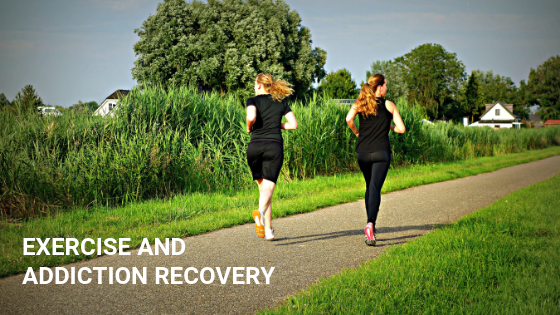
Exercise and Addiction Recovery
Addiction recovery typically involves a lot of counselling, self-help support groups and in general a lot of introspection. Introducing physical activity, regular workouts or an entire exercise regime into the efforts of recovery has been proven to have major benefits to help maintain sobriety. Studies suggest that exercise can lead to a sense of accomplishment; feeling stronger; improved health; and increased confidence in staying clean and sober.
When an addict is trying to recover, their body and mind crave the endorphins that lead to the highly addictive artificial high. A vigorous sweat session can cause the release of those same endorphins, along with endocannabinoids; together these biochemicals can produce a feeling of euphoria, making it easier for someone in recovery to cope with daily life. Additionally it has been shown to increase the number of new nerve connections in the brain, which helps it heal from the effects of substance use. Although the ‘high’ one feels is most certainly less intense than the effect of drugs or alcohol, exercise does provide a pleasurable release for many people without any of the destructive side effects. Research has also shown that being physically active helps to stave off type 2 diabetes, heart disease and some kinds of cancer, as well as an immunity boost.
If you have not traditionally been an active person, start small. Consider simply going for a walk each day. Slowly build up to running or a attending a gym. Later you can enlist a workout friend that can help to keep you motivated. Exercise fills up your time in a good way. When you prioritize physical activity it purposefully eats up part of your schedule. Working out regularity can introduce a focus to your life, allows you to live in the present. It keeps boredom and unhealthy cravings at bay. Often it is difficult to get the inertia to force yourself to go for a run or a workout. In this case consider the post-workout benefits: increased energy, better mood, reduced stress, clearer thinking. As you add more time and/or intensity to your regimen, you’ll see the physical and mental health benefits that come with it and you’ll start to feel stronger and more competent in other areas of your life, including your ability to meet the challenges you’ll face in recovery.
As mentioned exercise helps you sleep more soundly. Addiction is known to disrupt many body processes, including circadian rhythms, making it difficult to fall asleep or sleep uninterrupted without using drug of choice. As your body gradually returns to a healthier, balanced state, a normal sleep cycle will allow your body to heal faster.
It’s common for recovering addicts to have trouble dealing with rage and feeling frustrated and expressing these emotions in unhealthy ways. Going for a run, lifting weights or even hitting a punching bag can help you manage anger and frustration without relapsing. Additionally, an exercise routine can become your go-to tool to reduce stress, regain composure and weather a crisis or rough periods.
One note of caution is that recovering addicts are susceptible to “substitute addiction or addiction transfer,” which means replacing one addiction for another. Many have fallen into that trap with exercise, so if you find yourself obsessing or over doing it, it may be worth considering limiting your workout time and talking to someone about it. By being aware and proactive about substitute addiction you can use exercise to your advantage.
Exercise can be a tremendous benefit during and after recovery. At Ibiza Calm, we have an expert team of professionals available at all times for any number of addictions you or a loved one may be suffering with, so please do not hesitate to call us if you need any help or advice.
(SPAIN) +34 664 443 433 (UK) +44 203 868 5710
Share this information, choose your platform!
New beginnings – Is it time for you to make a change?
Yes, it’s that time of year again. The lull period between the Christmas and the Hogmanay festivities gives us a chance to reflect on the 12 months just gone. Were they good? Did we achieve what we set out to …
The “Winter Blues” or seasonal affective disorder (SAD)?
The festive season has come and gone, and most of us are left feeling a little flat. During the excitement, parties, and all the planning that goes into the holidays, it has been easy to ignore that the days are …
Tips to help you stop doomscrolling
Do you find yourself inexplicably drawn to negative news articles and websites full of doom and gloom? Do you frequently get sucked into an endless cycle of clicking from one depressing social media post to the next? If you regularly …
Are you assessing your alcohol use?
January is typically the season for change. The start of a new year often inspires reflection on the previous one and a flurry of resolutions. After the excesses of the ‘ber month holidays (Halloween, Diwali, Thanksgiving, Hanukkah, Christmas, New Year’s) …









